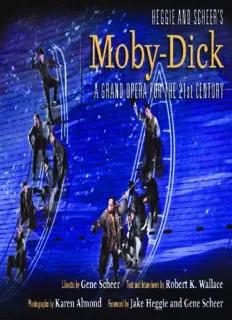
Heggie and Scheer’s Moby-Dick: A Grand Opera for the Twenty-first Century PDF
Preview Heggie and Scheer’s Moby-Dick: A Grand Opera for the Twenty-first Century
Heggie and Scheer’s Moby-Dick HEGGIE AND SCHEER’S Moby-Dick A GRAND OPERA FOR THE 21st CENTURY Robert K. Wallace featuring Libretto by Gene Scheer Photographs by Karen Almond University of north texas Press Denton, texas Text ©2013 Robert K. Wallace Libretto ©2013 Gene Scheer Photographs ©2013 Karen Almond Foreword ©2013 Jake Heggie and Gene Scheer All rights reserved. Printed in China 10 9 8 7 6 5 4 3 2 1 Permissions: University of North Texas Press 1155 Union Circle #311336 Denton, TX 76203-5017 The paper used in this book meets the minimum requirements of the American National Standard for Permanence of Paper for Printed Library Materials, z39.48.1984. Binding materials have been chosen for durability. Library of Congress Cataloging-in-Publication Data Wallace, Robert K., 1944- Heggie and Scheer’s Moby-Dick : a grand opera for the twenty-first century / by Robert K. Wallace ; featuring libretto by Gene Scheer ; photographs by Karen Almond. p. cm. Includes bibliographical references and index. ISBN 978-1-57441-507-0 (cloth : alk. paper) -- ISBN 978-1-57441-520-9 (ebook) 1. Heggie, Jake, 1961- Moby-Dick. 2. Opera--Production and direction--Texas--Dallas. 3. Operas--First performances--Texas--Dallas. 4. Melville, Herman, 1819-1891--Musical settings-- History and criticism. I. Almond, Karen. II. Melville, Herman, 1819-1891. Moby Dick. III. Scheer, Gene. Moby-Dick. IV. Title. ML410.H432W35 2013 792.5’42--dc23 2012042476 Book design by Mark Lerner Frontispiece of Ahab in his cabin under the fire of the Try-Works is by Karen Almond. All photos by Karen Almond unless otherwise noted. CONTENTS Foreword by Jake Heggie and Gene Scheer vii Acknowledgments ix prologue Setting the Stage 1 part 1 Creative Voyage, 2005–2010 11 part 2 Libretto by Gene Scheer: Moby-Dick, An Opera in Two Acts 59 part 3 Rehearsing a World Premiere, March–April 2010 93 part 4 Moby-Dick on the Opera Stage 121 act 1 123 act 2 163 bows, backstage, and bios 197 epilogue Sailing On 205 Notes 213 References and Resources 215 Index 221 FOREWORD BY JAKE HEGGIE AND GENE SCHEER The journey To opening nighT of our opera, Moby-Dick, was one of the most exciting and terrifying either of us could have imagined. From the day in April 2008, when we set to work in earnest on Nantucket Island, we were aflame with the power of Melville’s great novel while faced with the daunting task of distilling and reimagining it as an operatic stage work of less than three hours. Was it really possible to achieve, or were we, too, chasing a white whale, caught up in a mad fantasy? Sustained by our belief that opera—the most powerful expression of music theater—would be the ideal way to transfer Moby-Dick to the stage, we were cheered on and supported by a brave consortium of five major opera com- panies, as well as a brilliant cast and creative team. Everyone involved was faced with immense hurdles. Together, as a team, with the tremendous spirit of Melville’s invention to guide us, we negotiated our way through numerous drafts of the libretto, score, staging and design: a path that included periods of writer’s block, near despair, exciting breakthroughs, workshops, cuts, revisions, revelations, and suddenly a complete opera. Even after all the work and rehearsals, the path was fraught right up to opening night at the Dallas Opera when the entire computer system for the production crashed two hours before curtain. It was revived just in time and, amazingly, the downbeat occurred at 7:30 p.m., on schedule. Welcome to the high-wire act of opera and the operatic voyage of Moby-Dick. Robert Wallace’s beautifully comprehensive chronicle is illustrated with Karen Almond’s vivid photography. We are deeply grateful for their passion and commitment to telling the story as they open a door for you to the mysterious, rather mad work of creating a big, bold, new American opera for the 21st century. viii foreword ACKNOWLEDGMENTS i knew i wanTed To wriTe This book when I experienced the world premiere production of Heggie and Scheer’s Moby-Dick in Dallas on May 16, 2010. I knew I could write such a book when interviewing Jake Heggie in San Fran- cisco one month later. The illuminating answers he gave during our day-long interview, the working manuscripts he showed me in the studio in which he had composed the opera, and his willingness to ease my access to the rest of the creative team, to all of the principal singers, and to key personnel at The Dallas Opera inspired me to take the plunge and devote myself to writing a book that would allow readers to experience how Heggie and his libret- tist Gene Scheer had created the score and the text of the opera with the help of dramaturg Leonard Foglia and conductor Patrick Summers; how eight principal singers, forty male choristers, seventy-five symphony musicians, and a surplus of supernumeraries had brought the score to life in five weeks of rehearsals in Dallas supported by an extraordinary production team; and how the audiences that filled the Winspear Opera House in late April and early May of 2010 were transported into the rare kind of ecstasy that the world premiere of an operatic masterpiece can create. From the beginning, librettist Gene Scheer made his text available and shared invaluable insights into process by which he turned Melville’s gargantuan, intimidating novel into a tight, challenging, singable opera script. Leonard Foglia helped me understand the role of a theatrical professional in translating the text and the music into a performance
Description: